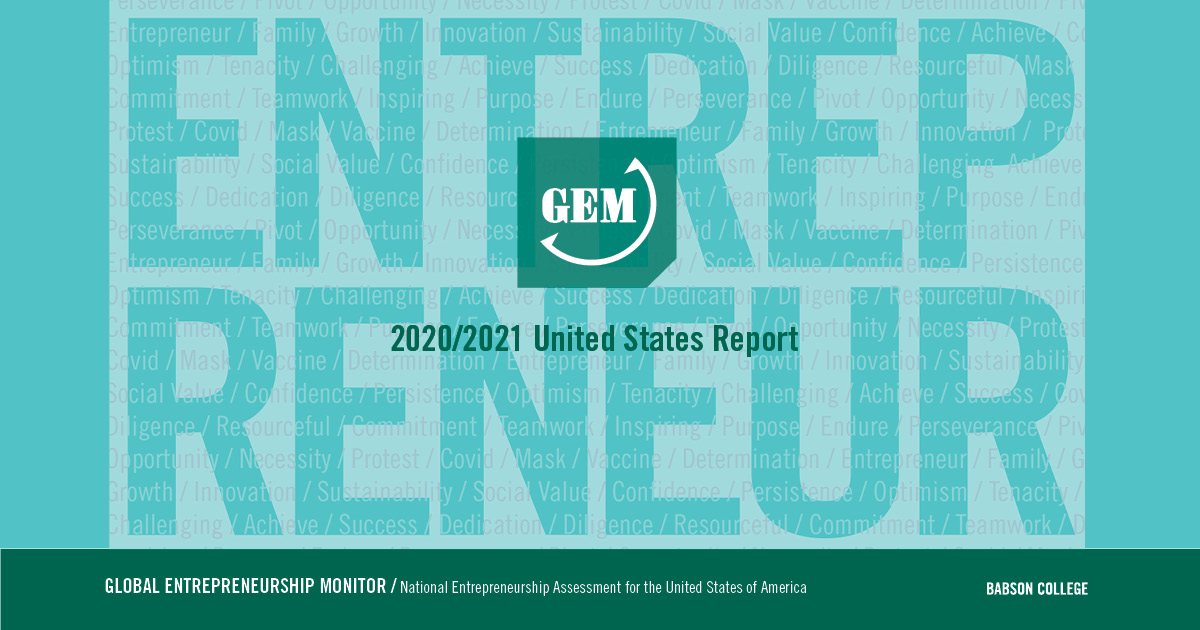New U.S. GEM Report Offers First Look at Pandemic’s Impact on Entrepreneurship

A once-in-a-century pandemic, COVID-19 disrupted industries and lives around the world.
It forced companies and employees to adjust to unprecedented and changing conditions seemingly on a daily basis. It created dramatic circumstances, driving the need to survive—to keep businesses afloat and to keep food on the table and a roof overhead.
It also forged opportunities—both for established entrepreneurs and those with entrepreneurial instincts. Entrepreneurs, of course, didn’t escape the negative economic effects and pressures of the pandemic, but they found and pursued ways to survive and thrive through the crisis.
In fact, in 2020, one-half of entrepreneurs said they were motivated to start a venture because jobs were difficult to find, representing a 22% increase from 2019, according to Babson College’s new 2020/2021 U.S. Global Entrepreneurship Monitor (GEM) report, released Wednesday. The report also found that 54% of entrepreneurs and 43% of business owners reported that the pandemic introduced new business opportunities.
Read the complete 2020/2021 U.S. report from the Global Entrepreneurship Monitor.
“People may have different reasons for starting a business: needing to generate income or seeing new opportunities, for example, but the GEM results show that people will still turn to entrepreneurship, even in the throes of a social and economic crisis,” said Smaiyra Million P’21, executive director of The Arthur M. Blank Center for Entrepreneurship at Babson College.
Challenges and Opportunities
The newest U.S. GEM report provides a comprehensive look at the impact COVID-19 had on entrepreneurs and business owners six months after the pandemic began disrupting American life and business.
“The United States has long relied on entrepreneurs to drive innovation, job creation, and economic growth,” said GEM U.S. team co-leader and Babson College Entrepreneurship Professor Donna Kelley P’24. “There is no question that the COVID-19 pandemic created both challenges and opportunities for entrepreneurs and mature business owners.”
The report, which polled more than 2,000 U.S. adults in August 2020, showed that the Total early-stage Entrepreneurial Activity (TEA) rate—which measures the percentage of adults aged 18 to 64 who are actively engaged in starting or running a new business—declined slightly in 2020. The rate of 15.4% (down from 17.4% in 2019) was equal to the rate reported in 2018.
“The GEM results show that people will still turn to entrepreneurship, even in the throes of a social and economic crisis.”
Smaiyra Million P’21, executive director, The Arthur M. Blank Center for Entrepreneurship
Among the GEM report’s critical findings from the first six months of the pandemic:
- About 40% of Americans knew at least one person who closed a business due to COVID-19, although 21% knew someone who began a business.
- 82% of entrepreneurs thought starting a business was more difficult, and nearly 70% identified the pandemic as causing setbacks in getting their businesses operational.
- Among established business owners, 58% halted some of their core business activities because of COVID-19.
Of those who closed a business, more than one-third cited the pandemic as the reason. - Despite the hurdles, though, the report’s bottom line is clear.
“It shows how important entrepreneurship is to the U.S. economy and to global economies,” said Jeffrey P. Shay ’87, MBA’91, the executive director for academic operations at Babson College’s The Arthur M. Blank School for Entrepreneurial Leadership.
Data on Black and Women Entrepreneurs
The new GEM report, though, looked at more than just the pandemic. Among its other key findings was illuminating data on the state of Black and women entrepreneurs.
Most notably, the report shows, Black individuals are twice as likely as white individuals to have entrepreneurial intentions (20% vs. 10%) and nearly twice as likely to start businesses (26% vs. 14%). However, Black entrepreneurs are half as likely to be running mature businesses (5% vs. 10%) and report higher business closures (6% vs. 4%) than white entrepreneurs.

Yulkendy Valdez ’17 (left) and Josuel Plasencia ’17 founded a Boston-based venture, now called ForeFront, which helps companies teach young employees and their managers inclusive leadership skills.
Shay points to a variety of factors, including more difficulty and fewer avenues to raising capital, which can be key to establishing and growing successful businesses.
“Does that have to do with other characteristics of our economy that we already know about?” Shay asked. “We know that in many established companies that we’re trying to make changes now to address issues concerning equity and inclusion. Similar changes need to be made to provide greater accessibility for Black entrepreneurs to startup and growth capital.”
Meanwhile, the GEM report showed that the TEA rate for women was 16.6%, trailing the TEA rate for men of 18.3%, meaning that there are about eight women entrepreneurs for every 10 men entrepreneurs. However, more men than women reported closing a business in the year prior to 2020: 6.8% of men (a 24% increase from 2019) and 5.4% of women (a 13% increase from 2019).
“The GEM report sheds light on the fact that there are many Black entrepreneurs and women entrepreneurs who are waiting on the sidelines and want to get on the escalator to do this right,” Shay said, “so the report supports efforts to increase opportunities.”
Looking Forward
As the United States and the world continue to navigate the challenges posed by the pandemic, the GEM report provides insights that can help bolster entrepreneurship and help light the path forward.
“Stable jobs and economic vitality depend on the survival and growth of businesses,” Kelley said. “This research can help guide decisions that support entrepreneurship in America, which will surely be a critical contributor to the post-pandemic recovery.”
Shay, for one, says the report is vital reading for policymakers and decision-makers. “We want it in the hands of every governor, every senator throughout the United States, and we want the Small Business Administration to be reading this report,” Shay said. “That’s the type of value that this report has.” Shay says it should be used in making policy decisions, such as prioritizing support for entrepreneurs and entrepreneurial activity and providing relief for small businesses.
With the new report offering the first in-depth look at the pandemic, which continues to impact industries and people, the work of GEM continues to be valuable, especially illuminating the importance of an entrepreneurial mindset even during a crisis.
“Much like the Great Depression or World War II, the pandemic promises to be a transformative event, one in which the society we knew is remade and filled with change and possibility and entrepreneurial leaders will lead the way,” said Babson College President Stephen Spinelli Jr. MBA’92, PhD. “GEM will be there to witness and capture this extraordinary moment, and through research, we will continue to understand and learn from entrepreneurs and help guide them as they shape the world of tomorrow.”
Posted in Insights




